Main Content
Ever wonder how adults end up in their profession? Ever asked them to see if what they are doing now is what they thought they would be doing back in high school or even college? For some people, they are doing exactly what they thought they would do, for others they have found a new or different area of interest during their studies and experience.
We decided to ask Dr. Sara Ruane, who is a co-author and contributor to the 4-H Animal Science Herpetology Blog.
In a previous blog post, we learned that Dr. Sara Ruane is an Assistant Professor in Herpetology and Evolutionary Biology at Rutgers University-Newark.
But…how did she get there?
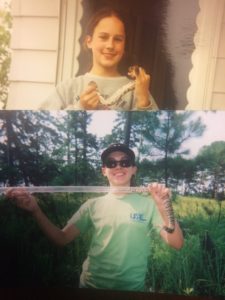
Dr. Ruane’s timeline from grade school to professor
Back in the 5th grade in Pennsylvania, Sara told her teacher she wanted to be a herpetologist. She loved reading books like those by the late Carl Kauffeld, who wrote about snakes and snake hunting. Sara also wanted to have lots of herp pets.
Even when Sara went to high school in NYC (not necessarily the place for reptiles and amphibians) she still wanted a career related to animals, and thought she could be a wildlife/exotic/zoo animal veterinarian. So she started looking at colleges specifically with pre-vet/animal science programs.
She chose the University of Massachusetts at Amherst due to their strong animal science program (still thinking she wanted to be a vet). At most schools, animal science is related to domestic animal vets/farm animals and not wildlife or research (although it could be). Classes in that major focus a lot on animal welfare, animal husbandry, etc. After having the chance to work with a biology professor, Dr. Ruane switched her major to biology and started focusing on evolution and ecology classes within the biology program. She took classes like mammalogy, herpetology, comparative vertebrate anatomy, evolution, and in particular, a systematics grad course that she loved! She ended up working with the herpetology professor in the biology department the entire four years of her undergraduate education!
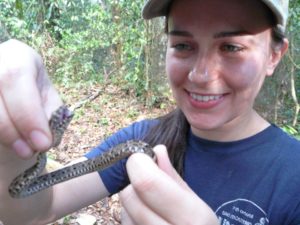
After college she did a four-month internship radio-tracking snakes in Florida. This afforded her an amazing chance to do some hands-on research and see what it was like being in the field every day. When that finished, she spent six months working at a zoo while she applied to master’s degree programs. Dr. Ruane says, “zoos are great but you better like cleaning cages – a lot.”
Fortunately, Dr. Ruane was accepted to multiple grad programs and was able to choose one at the University of Central Arkansas, as it was on a topic of interest for her (turtle ecology) and used a lot of the skills she had from her internship in Florida (radio-telemetry, riding an ATV), plus there was funding already available for it. One of 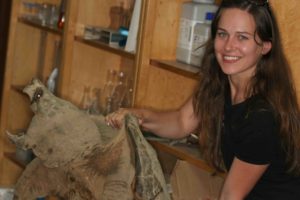 the great things about graduate programs in the sciences is that, typically, you can go to school for free and often get paid to teach undergraduate classes, unlike vet or med school where you pay money to attend. She paid zero dollars to get her M.S. and Ph.D.
the great things about graduate programs in the sciences is that, typically, you can go to school for free and often get paid to teach undergraduate classes, unlike vet or med school where you pay money to attend. She paid zero dollars to get her M.S. and Ph.D.
Despite her interest in ecology and turtles, she really wanted to focus more on snakes for her Ph.D. work and still had a lot of interest in systematics and evolution. She also wanted to move back to the northeast if possible (specifically near-ish NYC). She sent out emails of interest and applications, and had the chance to meet up in Arkansas with a professor from CUNY (City University in NYC) who was there doing salamander work but primarily works on snakes. They hit it off and she ended up joining his lab for her Ph.D. It was a great choice, because they are really good friends and work on a lot of projects together still!
Dr. Ruane spent many years working on her Ph.D. at CUNY studying snake systematics (on milksnakes!).
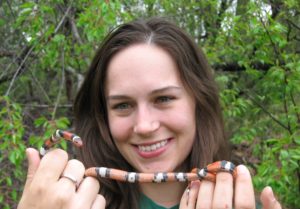
She did LOTS of field work, data collection, analyses, and writing, writing, writing.
After receiving a Ph.D., you take on short term positions for more experience. These are called “Postdocs”. One of Dr. Roane’s postdoc assignments was at the American Museum of Natural History, working on Malagasy snake systematics! And again, lots of field work, data collection, analyses, and writing, writing, writing. She had another at LSU (Louisiana State University) working on a mix of New Guinean snake descriptions/systematics and figuring out a protocol to use museum specimens to extract DNA for modern molecular work. While there was not so much field work, there was data collection, analyses, and writing, writing, writing.
During her time as a postdoc, she applied for ~70 professor jobs all over the USA and internationally. This required lots of writing for job applications too. These types of jobs are not a simple resume, but multiple pages describing your research and teaching skills. After many interviews and offers, the stars all aligned, and she came to Rutgers!
As an Assistant Professor at Rutgers-Newark, Dr. Ruane still works with her former mentors (so projects related to New Guinean, Malagasy, and American snakes are ongoing) and also has new projects with her students and new colleagues at Rutgers! And here, guess what she does? Lots of field work, data collection, analyses, and writing, writing, writing. (Are you seeing a theme here?)
Dr. Ruane -What advice do you have for high school students looking to go into animal science?
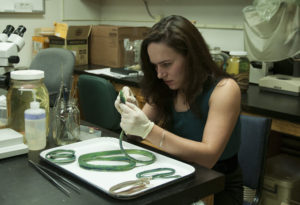
When looking at colleges, look not just at the names of programs, but what courses are offered in that program. Are they ones that interest you? These will all be listed in the college’s course catalog online or the department’s websites. Don’t just consider animal science as a major, look at biology major programs that have an evolution, ecology or zoology focus. Also, many schools have a conservation biology, wildlife or wildlife management majors that also will be research focused, if that’s more your thing. In addition, read popular science books! (e.g., Robert Sapolsky, Neil Shubin, David Quammen, Richard Dawkins, whoever writes on a topic that you find interesting but who is also a research scientist!)
Dr. Ruane -What would you recommend students take in HS to help in college?
In high school, take all the basic sciences offered (chemistry, organic chemistry, physics, and biology as you will have to take them all in college), as well as lots of math (especially statistics!), any type of computer programming, and writing classes. Those are the things you need the most in my experience and that I use regularly, and I took all of these again in college as well. If you can take AP versions of any of these types of classes, do it (because then either you’ll be really well prepared in college or possibly have the option to have those courses waived, but not every college does this). In addition, if you don’t have formal typing training, that is worth doing too, I write and type more than I do anything else!
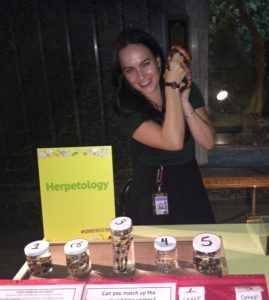
Dr. Ruane – are you doing what you have always hoped to do?
Absolutely! I always wanted to do what I read about people in books doing, “research” on wild animals, specifically herps, even if I wasn’t sure what that looked like day to day. Being a professor is just one way to achieve this goal, and it has worked out really well for me. One of the reasons I became a university professor is that you really set your own schedule and 80% of the time are essentially working for yourself. There are meetings and obligations you need to do (e.g., teaching classes), but otherwise you decide most everything about when you work and what you are going to work on for research projects. If I wake up thinking I want to start studying why some timber rattlesnakes are patterned and others are almost entirely pitch black, I can get going on that immediately and there is no one I need to ask; I run the show. As long as you are productive and publishing your findings, you are doing your job. You also spend your day hanging out with like minded people which is great as well, like other faculty and graduate students. This freedom is pretty awesome, and I don’t know any jobs quite like it! As my own Ph.D. mentor often said when I was a student, “this is the best job in the world”!
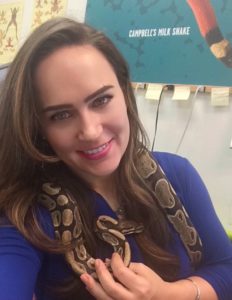
Written by:
Sara Ruane, Ph.D., Assistant Professor
Department of Biological Sciences
Rutgers University-Newark
Lisa Rothenburger, County 4-H Agent/Associate Professor
Department of 4-H Youth Development
Rutgers Cooperative Extension